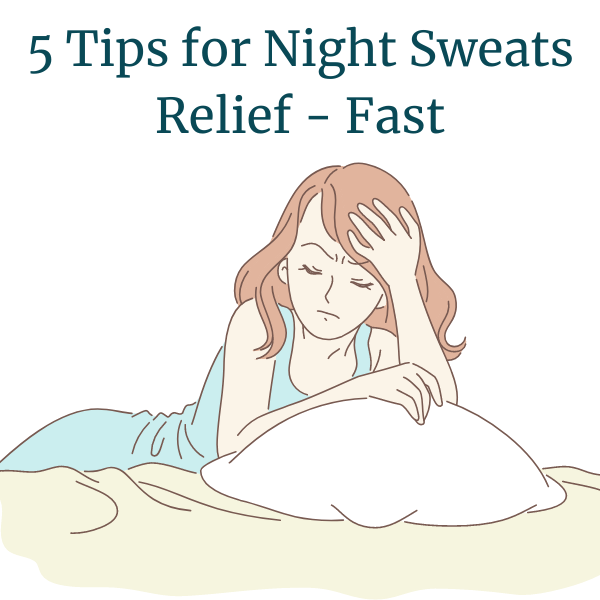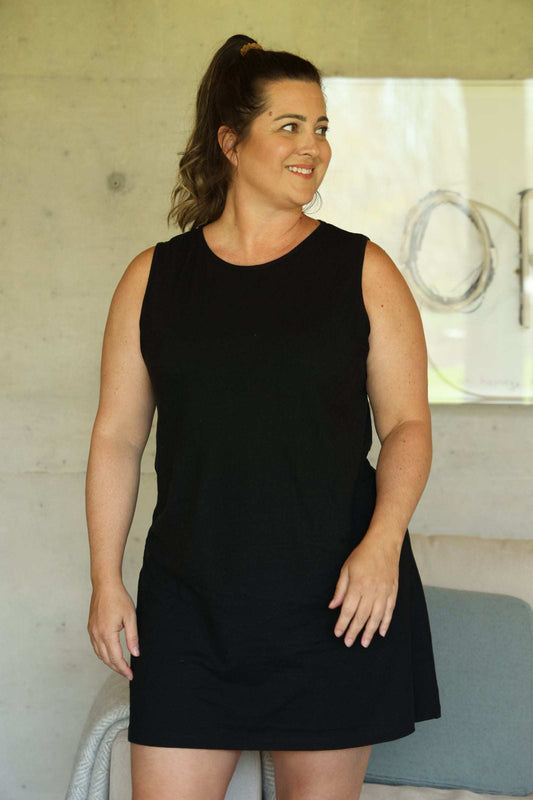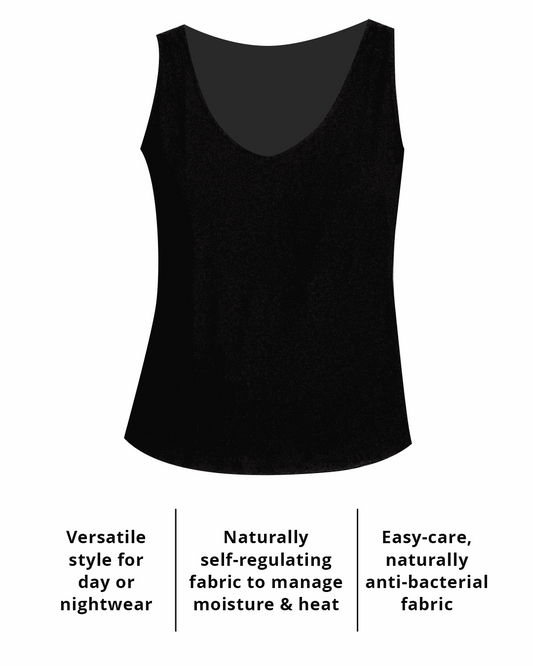
5 Tips to Relieve Menopause-Related Night Sweats Fast
Share
You toss and turn all night, flipping your covers every time you feel a night sweat coming on, pulling them back on when the chills start. If you sleep through a few hot flashes due to sheer exhaustion, you wake up drenched, change your sleepwear, and then can’t get back to sleep. The cycle continues all night long and can leave you sleep-deprived and clammy in the morning.

Researchers believe that menopause-related hot flashes are the result of your temperature control centre, the hypothalamus, goes off kilter due to, among other reasons, an imbalance in progesterone and estrogen as their levels in your body decline.
Up to 80% of women will experience hot flashes and/or night sweats. While they are unpleasant when they happen while you are awake, their effects can be debilitating when they occur frequently at night, contributing to insomnia causing sleep deprivation.
The good news is that you can have a certain amount of control over your night sweats as there is a strong link between lifestyle and the severity of night sweats and hot flashes. So, if you can identify and alter your lifestyle by identifying night sweats’ triggers, you can start reducing your night sweats and get your sleep back.
Seems simple enough, right?
It is, and it isn't. The problem is that the triggers differ for every woman. We are as individual and unique as snowflakes. I wish I could say, “Try this, this and this, and voilà! Bob’s your uncle, problem solved. Good bye night sweats.”
But, every woman responds differently to different triggers. A few simple adjustments may help you find relief for hot flashes overnight, or, you may need to try some other solutions that involve a little more dedication and discipline. If you’re like me, you try the quick fixes first and see how you do.
So, without further ado, here are 5 tips to try to see if they can help reduce your night sweats.
- Bedding: Use 250-300 thread count organic cotton sheets, Tencel, hemp or linen sheets as well as breathable layers or blankets and ditch the duvet. Luxury cotton weave sheets with a 400 thread count or more keep the heat and moisture trapped next to you.
- Sleepwear: Change your sleepwear to breathable, heat-managing, moisture-wicking sleepwear. You need sleepwear than can respond to your ever-changing ody temperature and moisture-levels. Choose sleewear made from hemp blends (like ours!), linen, Tencel fabric.
- Room Temperature: ensure you are sleeping in a room between 15-18C or (60-68F). Warm room temperatures can trigger night sweats. Estrogen is partly responsible for your resting body temperature at night. As your levels deplete, your resting temperature rises.
- Food choices: Avoid spicy, heavy meals at night. Your digestion system goes into overtime when you eat a big meal or a spicy one, which can trigger night sweats while your body is digesting. Save the big and/or spicy meals for lunch. At night opt for a salad, soup or eggs, something that is easy to digest.
- Beverages: Hot caffeine-free beverages should be ingested an hour or more before you go to bed. If your bedtime is 11PM, drink your tea between 9:30 and 10PM.
Notice I didn’t include cutting out caffeine, alcohol, or smoking – all of which are common night sweats’ triggers. Not only is cutting out these substances difficult for many of us, (myself included), the effects of doing so – as in a better sleep – are usually only seen after a few weeks or more. If you suffer from severe night sweats, please do try to cut back on any of these if you do them regularly - it may make a huge difference to your sleep quality.
Moving forward: If you find that these quick changes to your routine help, congratulations! You are on your way to a better more rested, drier sleep! If you found they made no difference, you might benefit from tracking your activities and foods and evaluating your sleep routine. You can do it on your own or you can use our handy night sweats e-journal. The journal can help you identify patterns based on your daily food and beverage intake, and exercise schedule, and help you narrow in on the triggers that are adding to or causing your night sweats.
Once you’ve identified your triggers, you can cut them out altogether or move them to earlier in the day. For instance, if you love coffee and drink it all day, try switching to decaf in the afternoon, or if possible, wean off caffeine altogether.
If you have any comments, questions or suggestions, let us know in the comments section.
Sweat Sweet dreams! ;)
You might also like:
The Link Between Alcohol and Night Sweats in Menopause
10 Reasons You're Waking Up Soaked
5 Tips For Better Sleeping When You have Night Sweats
Disclaimer: The content of this article is for informational purposes only and is not intended to be a substitute for professional medical advice, diagnosis, or treatment. Always seek the advice of your physician or other qualified health provider with any questions you may have regarding a medical condition. Never disregard professional medical advice or delay in seeking it because of something you have read on our website.




